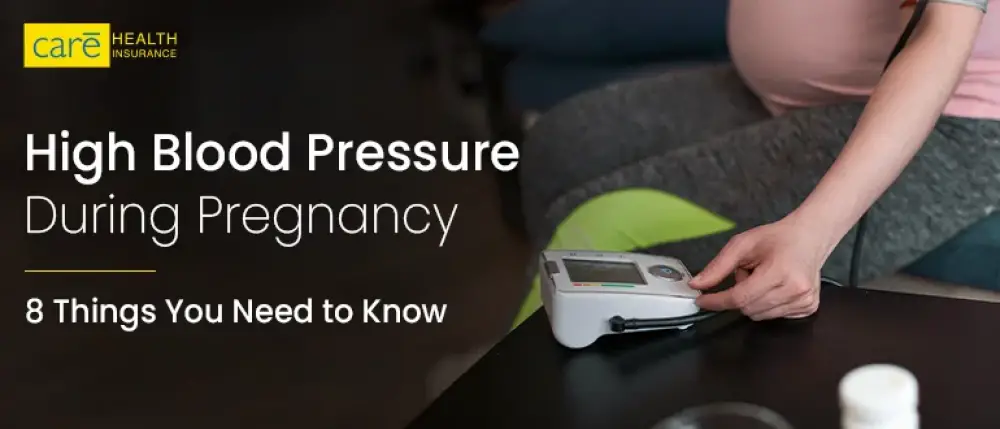Subscribe to get weekly insights
Always stay up to date with our newest articles sent direct to your inbox
Published on 20 Sep, 2024
Updated on 27 Mar, 2025
1270 Views
6 min Read

Written by Anjali Sharma
Reviewed by Akhil Pillai
favorite0Like
favoriteBe the First to Like
After a year of trying to start a family, Meera and Mukesh were overjoyed to announce their pregnancy. Their excitement was palpable as the whole family celebrated the good news. The first few weeks progressed smoothly, but between the 20th and 22nd week, Meera began experiencing headaches, nausea, and stomach pain. Concerned, the parents-to-be contacted their gynaecologist, who diagnosed Meera with high blood pressure.
High blood pressure during pregnancy is pretty standard, but it can be risky for both mom and baby. That's why proper treatment is so essential for a healthy pregnancy. In this article, we'll review everything you need to know about what causes high blood pressure when pregnant, the symptoms, and the different types. We'll also answer common questions about pregnancy and blood pressure.
High blood pressure is standard, but not every day. If not treated, it can become severe. It’s also a significant cause of premature death worldwide. 1.28 billion adults aged 30–79 have hypertension worldwide. Reducing it by 33% by 2030 is a global target. High blood pressure means too high pressure in your blood vessels. It is measured in two numbers: systolic and diastolic. The systolic number represents the pressure in blood vessels on heart contraction, and the diastolic number shows the pressure when the heart rests between beats.
Blood pressure and pregnancy are related. High blood pressure during pregnancy is commonly referred to as pregnancy-induced hypertension or gestational hypertension. Hypertension in pregnancy is also a common medical condition that complicates 5% to 10% of pregnancies. Hypertension is one of the leading reasons for maternal or perinatal mortality in India.
For pregnant women, the condition of hypertension is said to be predicted when a bp of 140/90 or even higher is recorded at least two times on two occasions at least four hours apart. Readings showing 160/110 or above are alarming and regarded as severe high blood pressure.
High blood pressure complications in pregnancy typically start from the second trimester and go back to normal after delivery. If ignored, high BP can create many complications for the mother and the baby. It may increase the risk of:
Hypertension during pregnancy can be managed when it's measured on time. Get your numbers gauged to know in which category your blood pressure falls out of 5.
Stage 2 High BP and Hypertensive crises become crucial and must be handled properly. You should get 7 to 9 hours of sleep daily, limit alcohol, engage in regular physical activity, and eat a heart-healthy diet with less salt.
The high BP in pregnancy is caused by different factors. It is important to diagnose different types and symptoms to get early treatment to avoid any complications.
The causes of blood pressure elevated during pregnancy are mentioned below. Take a look:
While occurrences of blood pressure increase during pregnancy are threatening to everyone, few individuals are more likely to be exposed to the risks:
If you notice the level of your blood pressure high while pregnant, you may or may not experience pregnancy complications. However, it is undeniable that hypertension exposes both mother and baby to potential risks. However, maintaining pregnancy blood pressure is still highly important. Explained below are some examples:
Hypertension or high blood pressure during pregnancy may not always have clear symptoms. However, there are certain signs attached to Preeclampsia:
If these symptoms of high blood pressure during pregnancy do not occur, your doctor may help. They will measure your blood pressure to give you accurate results.
The best way to prevent hypertension is to prevent the causes of high blood pressure in pregnancy. Here is how you do it:
Note: Remember to keep in mind that any changes or additions to your routine should be administered only after consulting your doctor.
With blood pressure higher when pregnant, complications may arise. However, careful monitoring and a few steps can help you deliver safely. Here you go:
>>Read More: Know the Risks of Hypertension in Pregnant Women
Pregnancy and high blood pressure can be diagnosed and treated with careful management. However, certain situations or symptoms demand your immediate attention. Here are some alarming signs when to see a doctor immediately:
With the many mental and physical changes happening to the woman’s body, issues like high blood pressure can further affect the health of a pregnant woman. Stress is one of the reasons for hypertension during pregnancy; financial hardship might be a cause. Having insurance coverage is a smart solution to lighten your economic burden. With the right health insurance coverage, you can ensure that your doctor visits or treatments are not compromised because of financial constraints. Knowing that you have adequate coverage allows you to focus more on the pregnancy and the well-being of the baby rather than worrying about arranging funds.
You can also opt for a maternity health insurance policy if you plan to start a family soon. Investing in the policy at the right time can be very helpful in managing the pregnancy-related expenses.
favoriteBe the First to Like
शुगर कंट्रोल कैसे करे? जानें, डायबिटीज में क्या खाना चाहिए Vipul Tiwary in Health & Wellness
Thyroid : मामूली नहीं हैं महिलाओं में थायराइड होना, जानें इसके लक्षण और घरेलू उपचार Vipul Tiwary in Diseases
हाई ब्लड प्रेशर को तुरंत कंट्रोल कैसे करें? देखें इसके उपाय Vipul Tiwary in Diseases
प्लेटलेट्स की कमी के लक्षण, कारण और इलाज क्या है Vipul Tiwary in Diseases
Your Survival Guide to Lactose Intolerance Ritika Malik in Diseases
Bursitis : Causes, Symptoms and Best Ways to Treat this Pain! Sejal Singhania in Diseases
What is a Coma: The Silent Fight to Wake Up! Sejal Singhania in Diseases
Struggling to Move Your Shoulder? Try These 7 Frozen Shoulder Treatments Gungun Bhatia in Diseases